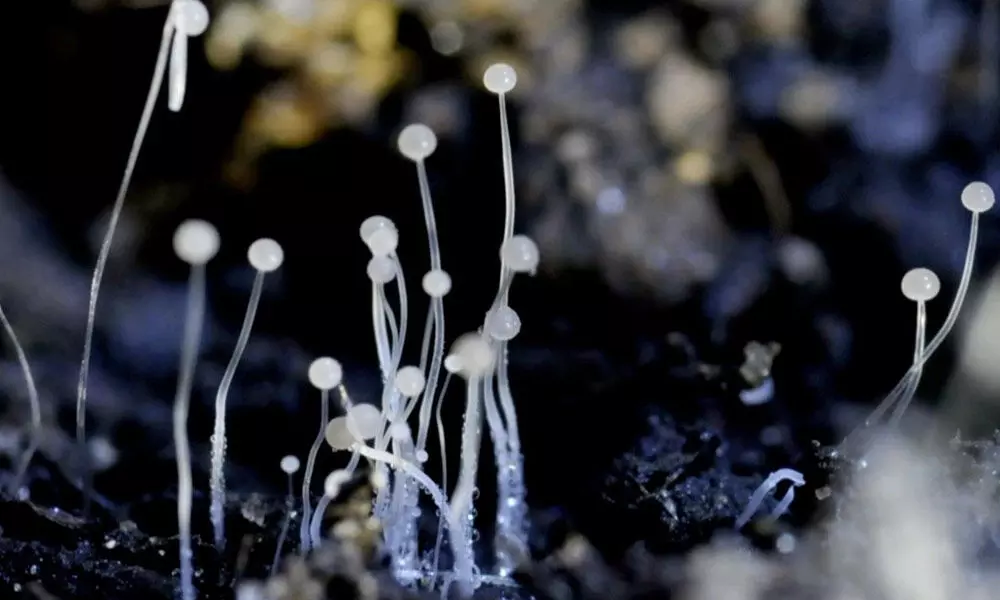Live
- CBI books Rajasthan narcotics inspector for Rs 3 lakh bribe
- Rajasthan bypolls: A tough contest between BJP and Congress
- Albania joins SEPA, paving way for EU integration
- Japanese government approves 250-billion USD economic package to ease price pain
- Six pharma companies to set up their units in Telangana
- The Unstable Events of a 17-Wicket Day in Perth: India vs Australia
- Dutch FM's Israel trip cancelled after Netanyahu's arrest warrant
- UK to increase energy price cap by 1.2 per cent
- Ethiopia launches national coffee platform to maximise earnings
- Centre completes auction of 3 coal blocks, to yield annual revenue of Rs 2,710 crore
Just In
Tamil Nadu Require More Drugs To Treat Patients Suffering From Black Fungus


Tamil Nadu Require More Drugs To Treat Patients Suffering From Black Fungus
Tamil Nadu: 1,196 cases of black fungus have been detected in 25 districts across Tamil Nadu. With 420 individuals admitted to government and private institutions, Chennai has the most cases whereas the state is facing several shortages of the required drug to cure the patients suffering from black fungus.
1,196 cases of black fungus have been detected in 25 districts across Tamil Nadu. With 420 individuals admitted to government and private institutions, Chennai has the most cases whereas the state is facing several shortages of the required drug to cure the patients suffering from black fungus.
380 patients have been admitted to government hospitals and 40 to private hospitals in Chennai. There are 142 patients in Madurai and 139 in Salem.
Earlier, Chief Minister M.K. Stalin had written to the Union Health Minister, requesting that at least 30,000 vials be allocated to the state right away.
According to Health authorities, the black fungus has impacted 1,196 patients in the State as of June 9, with a total amount of 7,330 vials of Liposomal Amphotericin-B provided by the Centre.
One of the health officials stated that on Wednesday, the state was given an additional supply.
On Thursday evening, Ma. Subramanian, the Minister for Medical and Family Welfare, told reporters that the amount of Liposomal Amphotericin-B vials allocated to the State had been increased to 9,520.
According to reports, the state had paid for 90,000 Posaconazole tablets, which had been prescribed in accordance with ICMR recommendations, and had got 42,000 of these. They have 39,500 pills in their possession.
However, the medicine is still in short supply. With the current supply of medications, authorities in government hospitals claim they have been able to treat patients with black fungus.
As per a senior doctor, the number of Liposomal Amphotericin-B vials delivered to the state was 'woefully low.' A total of 50 to 60 vials are required for each patient. As one patient requires four to five injections in a day. He added that the supply arrives in little amounts. Amphotericin-B emulsion is available while Liposomal Amphotericin-B is not. The former is less poisonous than the latter. The emulsion can be used as a substitute, but it must be administered with caution. Renal function in patients must be monitored. Liposomal Amphotericin-B is what we require.
On Wednesday, Madurai MP Su. Venkatesan took to Twitter to highlight Karnataka's higher allotment of medicine than Tamil Nadu. He claimed that Karnataka had got approximately 40,000 vials so far.
இதுவரை மொத்தமாகவே தமிழ்நாட்டிற்கு 8520 அம்போடேரிசின்-பி மருந்துகள்தான் வந்துள்ள நிலையில் கர்நாடகாவிற்கு இன்று ஒரே நாளில் 15,520 மருந்துகள் ஒதுக்கீடு செய்யப்பட்டுள்ளது. pic.twitter.com/mQwkz3BxXN
— Su Venkatesan MP (@SuVe4Madurai) June 9, 2021
He demanded a 'non-partisan' approach and asked union government to allot more Amphotericin-B to Tamil Nadu
The union government has allocated 8520 vials of amphotericin - b injection for treatment in black fungal infections to Tamil Nadu and 24950 vials to Karnataka.
— Su Venkatesan MP (@SuVe4Madurai) June 9, 2021
We demand non-partisan approach.
Union government, allot more for TN. @drharshvardhan @DVSadanandGowda #Blackfungus pic.twitter.com/U4UkyXC8e9
Recently, Union Minister Sadananda Gowda was disclosing records and vial allocations per state. This has been put to an end as there is no transparency in the Indian government. At the very least, the allocation should be proportional to the number of cases. The existing allocation system is extremely unbalanced.
He claimed he had already written to the Union Health Minister requesting permission to import the medicine because increasing domestic production would take time.
In terms of cases, Mohan Kameswaran, managing director of the Madras ENT Research Foundation and a member of the State government's black fungus task group, stated that there has been an increase in the number of cases and that patients are still being examined. It usually happens a few weeks following COVID-19 exposure. As a result, it will follow the pandemic and then begin to decline after a period of time.
Meanwhile, he stated that patients were still arriving late. There have been cases where patients have presented with eyesight loss. After a week or two, a diabetic patient recuperating from COVID-19 who was on steroids experiences pain in the face, sinuses, around the eyes, or behind the eyes, he advises seeking medical care right away.

© 2024 Hyderabad Media House Limited/The Hans India. All rights reserved. Powered by hocalwire.com






